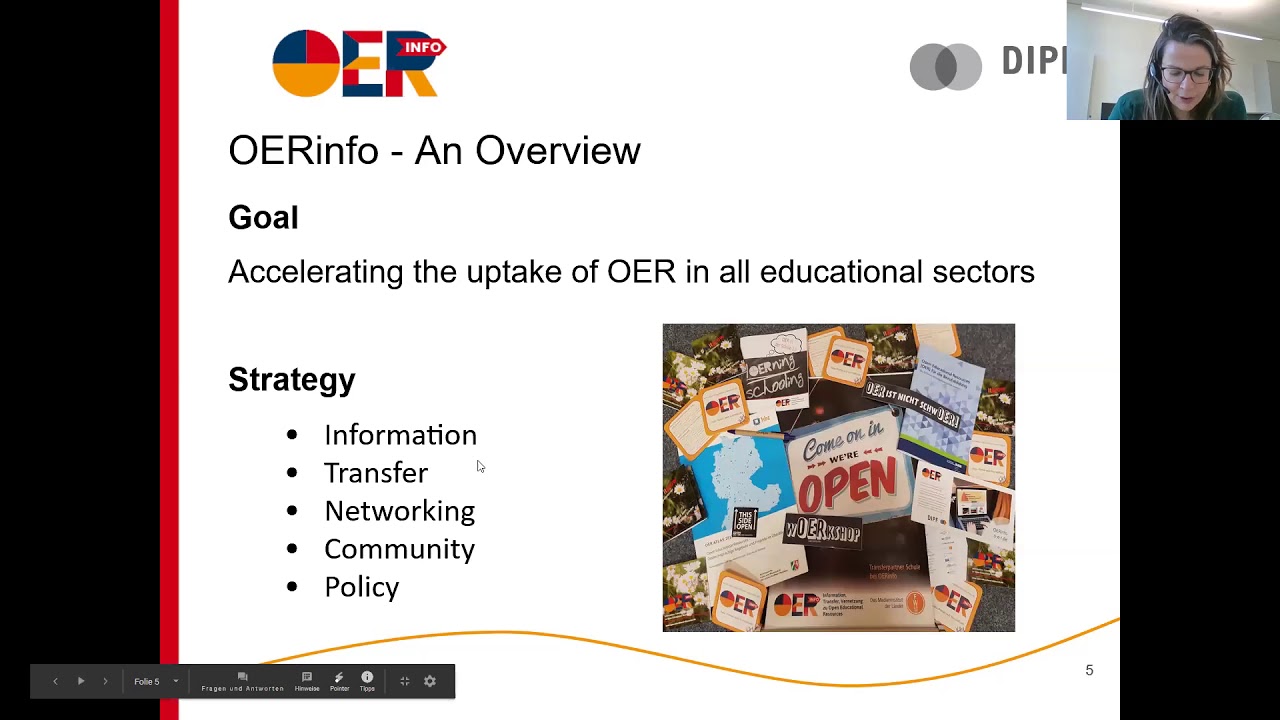Authors: Sigrid Fahrer, Jan Neumann, Jöran Muuß-Merholz, Daniel Otto, Gabi Fahrenkrog
Institutions: DIPF | Leibniz Institute for Research and Information in education, Hochschulbibliothekszentrum NRW (hbz), Jöran & Konsorten, University Duisburg-Essen
Country: Germany
Topic: Global Collaboration, Strategies, & Policies in Open Education
Sector: Lifelong Learning
UNESCO Area of Focus: Building capacity
Session Format: Panel
Abstract
In 2016, the German government launched the first federal OER funding program. More than 20 projects were funded nationwide across all educational sectors to spur the adoption of OER. Furthermore a project consortium was established that launched the first central OER information hub in Germany, consisting among others of the following institutions:DIPF | Leibniz Institute for Research and Information in education hosts the OER information hub www.open-educational-resources.de and is the coordinator of the project consortium “OERinfo” with its three main pillars, information, transfer, and networking.
Hochschulbibliothekszentrum NRW (hbz) provides the OER World Map that collects and visualizes data about OER related developments in Germany.
Learning Lab of the University Duisburg Essen supports and researches strategies for the adoption of OER in higher education.
Jöran & Konsorten acts as an activist agency for OER, and organizes OERcamps and is editor of the OER-Blog on www.open-educational-resources.de.
Altogether, the central goal of OERinfo is to raise awareness for OER and built capacity of stakeholders in accessing, using, adapting and redistributing OER. The expiring of the funding program at the end in October 2020 serves as an ideal moment for a conclusion and outlook for the further development of OER in Germany.
In this panel discussion, members of the first German OER funding program will present and discuss their lessons learned over the last four years and pitch their ideas on future strategies for OER. Since the panelists targeted different audiences in their respective projects and implemented different reach-out-strategies, the panel will give insight into a wide range of OER practices in Germany.
The discussion will focus on the journey the initiatives took: Where did they start out and where did they land? Where did they make their biggest impact? What are success factors? Where were the biggest challenges? What did they under- or overestimate?
Each panelist will start by pitching their specific perspective on what should be done in the future to further promote OER in their respective action area. This will serve as a starting point for opening up the discussion with the audience early on.
The outcome of this discussion will be threefold: First, the panelist will provide the audience with best practice examples for outreach-strategies and lessons learned. Second by drawing on the comments and experiences of the international audience it will be possible to locate the practices and lessons learned from OERinfo on a globale scale. Third, the transfer of know-how might result in cooperation and networks that could last beyond the expiration of the government funding program and help further promote OER in Germany.
Keywords
Germany, OER-Funding-Program, Lessons Learned, OER adoption
 slides:
slides:  video:
video:  book:
book: 